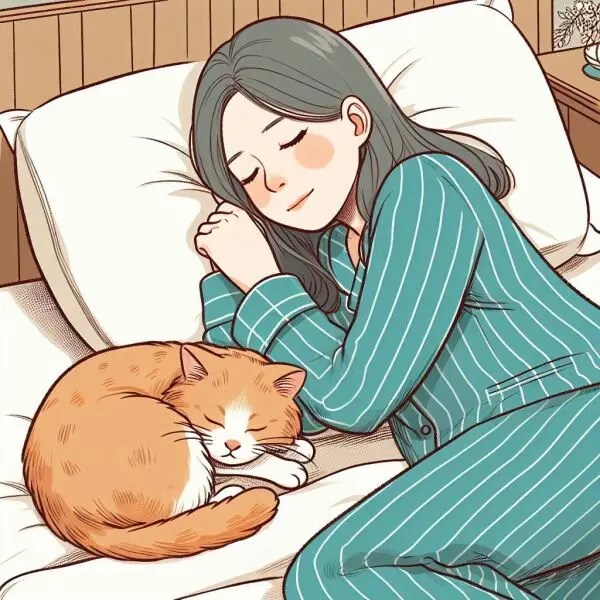Sleeping little causes dementia and serious health problems
The latest scientific studies on sleep point to a relationship between sleep problems and dementia. Discover how to improve and prevent this serious issue....
Table of Contents
Follow Patricia Alegsa on Pinterest!
Have you ever thought about how the amount of sleep you get impacts your mental health?
Imagine that every night your brain takes a refreshing "shower" that eliminates the waste accumulated during the day.
Sounds good, right? Well, that's the magic of sleep and its restorative power.
But be careful, sleeping too much or too little can have complex effects on your brain, and here we explain it to you with a touch of humor and lots of love.
Too little or too much
Sleeping less than six hours a night is like trying to clean a large mansion with a hand broom: it's simply not enough. And if you sleep more than nine hours, it's like you never cleaned, you just piled up more things in the corner.
Both extremes are associated with a higher risk of neurodegenerative diseases like Alzheimer's.
Can you imagine sleeping so much that you need an alarm at noon or so little that you wake up with the roosters? Use logic and aim for balance.
The sleep and dementia enigma
Here comes the mysterious part: scientists know that sleep and dementia are connected, but understanding that relationship is like putting together a thousand-piece puzzle.
Dementia can disrupt sleep, and lack of sleep can influence dementia – it's a crazy cycle.
What do you think about this? Do you have trouble falling asleep due to something specific or do you always feel like something is missing?
A nighttime shower for the brain
Now, a fun fact: during sleep, the fluid surrounding our brain cells works to eliminate waste, including the dreaded amyloid protein.
If you stay awake for too long, you accumulate more of these wastes – like if your room filled up with dirty socks because you never put them in the laundry. That's why sleeping between seven and nine hours is crucial to clean your brain "room."
Sleep apnea: the silent saboteur
Nighttime snoring? Sleep apnea? These disorders disrupt deep sleep and are sadly linked to dementia.
Think of sleep apnea as a thief that sneaks into your house every night to steal that rejuvenating rest. Interesting, right? If you suspect you may have sleep apnea, a medical check-up may be an excellent idea.
In the meantime, I suggest you schedule to read this article:
I wake up at 3 am and can't go back to sleep, what do I do?
In the meantime, I suggest you schedule to read this article:
I wake up at 3 am and can't go back to sleep, what do I do?
Too much of a good thing
Listen to this: sleeping more than necessary could also be counterproductive. If you find yourself sleeping like a bear in hibernation, it could be a sign of other underlying health problems such as depression or cardiovascular issues. So, like everything in life, moderation is key.
Early signs and intervention
Sleep problems can be an early warning sign of dementia.
It's like your brain telling you, "Hey, I need help down here!" If you notice drastic changes in your sleep patterns, it is advisable to consult with a specialist, a second opinion never hurts!
You might also like to read:
Benefits of Morning Sunlight: Health and Sleep
You might also like to read:
Benefits of Morning Sunlight: Health and Sleep
Reflect on your sleep
Let's take a pause for you to reflect! How many hours do you sleep per night, do you truly rest?
Write down your sleep patterns for a week and observe any irregularities. It could be the first step towards a significant change in your health.
Sleeping properly is essential to keep your brain sharp and reduce the risks of developing dementia.
So, dear reader, are you ready to prioritize your sleep? Remember, balance is not only the key to the circus, but also to life – and especially to sleep.
I hope these points have given you something to think about, and hopefully contribute to more restful nights and more energetic days. Sweet dreams and rest like a champion!
In this article, I explain how I managed to solve my sleep problems in just 3 months:
I Solved My Sleep Problem in 3 Months: Let Me Tell You How
I Solved My Sleep Problem in 3 Months: Let Me Tell You How
Subscribe to the free weekly horoscope
Aquarius Aries Cancer Capricorn Gemini Leo Libra Pisces Sagittarius Scorpio Taurus Virgo
-
 It is not advisable to take aspirin to prevent coronary diseases in healthy individuals
It is not advisable to take aspirin to prevent coronary diseases in healthy individuals
Discover in which cases the use of heart medications is recommended, according to the American College of Cardiology and the Heart Association. -
 Black Pepper and Olive Oil: The Duo That Multiplies Nutrients
Black Pepper and Olive Oil: The Duo That Multiplies Nutrients
Black Pepper and Olive Oil: The Duo That Multiplies Nutrients Adding black pepper and olive oil to your daily dishes improves the absorption of vitamins and carotenoids, enhancing every nutrient. -
 What does it mean to dream of umbrellas?
What does it mean to dream of umbrellas?
Discover the true meaning behind your dreams with umbrellas: protection, uncertainty, change? Discover what your subconscious is hiding. -
 This is the future you deserve
This is the future you deserve
To have the future you deserve, you must believe in reality. -
 What does it mean to dream of candles?
What does it mean to dream of candles?
Discover the meaning behind your candle dreams and how they can influence your life. Ignite the flame of your dream interpretation with this informative article.
I am Patricia Alegsa
I have been writing horoscope and self-help articles professionally for over 20 years.
Subscribe to the free weekly horoscope
Receive weekly in your email the horoscope and our new articles on love, family, work, dreams and more news. We do NOT send spam.
Astral and numerological analysis
-
 Discover your future, secret personality traits and how to improve in love, business and life in general
Discover your future, secret personality traits and how to improve in love, business and life in general
-
 Online Dream Interpreter: with artificial intelligence
Do you want to know what a dream you had means? Discover the power of understanding your dreams with our advanced online dream interpreter using artificial intelligence that responds to you in seconds.
Online Dream Interpreter: with artificial intelligence
Do you want to know what a dream you had means? Discover the power of understanding your dreams with our advanced online dream interpreter using artificial intelligence that responds to you in seconds.
-
 What does it mean to dream of sunflowers?
What does it mean to dream of sunflowers?
Discover the meaning of sunflower dreams in this fascinating article. Is it a harbinger of good luck or a warning? Find answers here! -
 The fish that reduces cholesterol and beautifies the skin
The fish that reduces cholesterol and beautifies the skin
Discover the freshwater fish that lowers cholesterol, improves the skin, and is easy to digest. Rich in proteins and Omega-3, perfect for a healthy diet. -
 What does it mean to dream of a helicopter ride?
What does it mean to dream of a helicopter ride?
Discover the hidden meaning behind dreaming of a helicopter ride. Is it a sign of success and adventure or a reflection of insecurity and fear? We explain it all in our latest article. -
 The Surprising Benefits of Swimming for Body and Mind
The Surprising Benefits of Swimming for Body and Mind
Discover swimming: the perfect exercise for everyone. Improve your cardiovascular health, strengthen muscles, and relieve stress while having fun. Dive in now! -
 Bad advice that can ruin your relationship
Bad advice that can ruin your relationship
Discover the classic tips that might surprise you and I'll explain why they might be totally wrong - don't miss it! -
 What does it mean to dream of mirrors?
What does it mean to dream of mirrors?
Discover the fascinating world of dreams with our article on What does it mean to dream of mirrors? We explore the different contexts and symbolisms behind this common dream. -
 What does it mean to dream of exams?
What does it mean to dream of exams?
Discover the meaning behind your exam dreams in this fascinating article. Find out if your dreams are telling you something important about your life. -
 What does it mean to dream of papers?
What does it mean to dream of papers?
Discover the true meaning behind your dreams with papers. Are you looking for answers? This article will guide you through the interpretation of your dreams. -
 What does it mean to dream of rain?
What does it mean to dream of rain?
Discover the meaning of your dreams with rain and how they can reflect your current emotions and circumstances in this complete article. Don't miss it! -
 Discovering Happiness: Essential Self-Help Guide
Discovering Happiness: Essential Self-Help Guide
Discover how poetry unravels the secrets of happiness, guiding you in your quest towards complete satisfaction and joy. -
 What does it mean to dream of riding a bicycle?
What does it mean to dream of riding a bicycle?
Discover the meaning behind your bike ride dreams. Find answers about your past and future in this comprehensive and detailed article. -
 What does it mean to dream of acquaintances?
What does it mean to dream of acquaintances?
Discover the true meaning behind your dreams about people you know - find out how these people may be reflecting emotions and situations in your life! -
 What does it mean to dream of factories?
What does it mean to dream of factories?
Discover the meaning behind your factory dreams. Are you being productive or do you need a change? Find out how to interpret your dreams here.